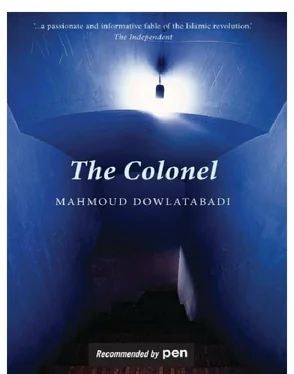the colonel felt guilty, too — guilty for the very existence of his children, or lack of it, as the case may be. He bore the burden of the offences of each one of his offspring on his shoulders. As for Amir, apart from having fathered him, he was guilty of harbouring him and allowing him to just sit there in a corner. Although he had done his duty as a father, he could not rid himself of the leprotic grip of a feeling that he was somehow his accomplice, and he passively awaited the day of his punishment. He did not hide from himself that maybe one day, out of sheer exhaustion and confusion, he would lose his grip and would bring this day forward, perhaps by strangling his son and rushing out naked into the street and running to the only hospital in town — the one which had just been opened, and the only psychiatrist had been accused of treason and committed to the central madhouse in Tehran for ‘treatment and re-education.’
Up to now he had managed to live with Amir and his problems. Whenever he ran into other people, however unimportant, he behaved as if Amir did not exist, and tried to pretend that he was estranged from his son. He would sometimes even go so far as to believe it himself. But on the other hand, after such encounters he would always reproach himself, telling himself that what he had done had been sheer egotism and selfishness. He asked himself what he was hoping to achieve by such egotism. And in response he came up with the following dictum: people who are drowning in a sea of problems and have lost all sense of self-worth often grasp at egotism and alienation from everything outside themselves as their only point of fixity, and this can help anchor and fortify them — if only to the point of madness. This is what it can come to, then, if you live in a hostile environment and have lost all your dignity.
I’m capable of anything when the world treats me as nothing. If the world throws me out, then I’ll become my own world. I’ll become like the ant which fell in the water and, thrashing about wildly, shouted: ‘The whole world has been washed away!’ And, insofar as I have become nothing, all things are therefore permitted unto me, even unto strangling my son and running about naked in the street all the way to the madhouse… No, I’ll never, ever lose my nerve. I’ll stand by my children through thick or thin. I’ll keep a stiff upper lip and never forget that I’m a soldier…
“But, Sir, I am just a simple soldier…”
“We are all soldiers, colonel. Haven’t I made myself clear?”

Amir was still awake when the colonel got home. His wife was still out. They were all well used to Forouz’s late-night absences by now. As he had got older, even the colonel had got used to them. Perhaps the sense that he was in danger of eventually just taking everything in his stride played a part in his next decision. So he sat up and waited for her. When Forouz turned up well after midnight, drunk as usual, she flopped like a corpse into bed without more ado. She knew very well that her husband knew exactly what she got up to at night. Sometimes the colonel was aware of her hand sliding under her pillow to pull out a small bottle of sleeping pills.
That rainy night was the last time that the colonel had drunk himself senseless. Amir was sitting at a little table doing his homework and the colonel was sitting on the edge of his single bed, knocking back glass after glass of vodka, not knowing what he was doing or, rather, he knew exactly what he was doing and was drinking to forget. He persuaded himself that he didn’t know what he was doing, using a thousand and one tricks to convince himself that he had lost all power of rational choice. And that was the state of mind he was in when he put the final touch to the plan that he had been toying with for some time.
the colonel was weeping. He did not know how long ago it had started. All he could feel was that his eyes were burning with alcohol and — probably — red with his tears. Everything round him was swimming and he could not make out whether it was his own Amir sitting at his little table by the window, or someone else. Nor could he make out whether Amir was looking at him or was staring at the pages in front of him with his ears pricked up to listen to what his father was saying, to the incoherent, crazed ramblings, welling up from deep inside him, as if from some other person. He thought, he hoped that Amir could see what a state he was in. He was sure that Amir had recognised his mother for what she was and could see the fix that his father was in, and that he had no choice but to do what he was about to do. For it seemed only natural to the colonel that the convulsions and spasms that were shaking his whole being should be transmitted to the closest person to him, to his son, who was right there in front of him. And why shouldn’t Amir be part of the tragedy?
the colonel sensed that the hairs on his son’s neck were standing on end with horror, but his instinct also told him that Amir was at one with his father in what he intended to do, and would help him, for he saw that all the powers of the earth, visible and invisible, were behind him in the crime that he was about to commit. Without allowing himself a second’s doubt as to Amir’s ideas on the matter, his one thought was to make him his accomplice in the deed.
Yet at the same time he could not involve Amir in the crime. the colonel thought himself a fair man and, however much Amir might sympathise with him, he could not be so selfish as to expect his boy to turn his hand to murdering his mother. After all, he knew that to kill someone, let alone kill one’s own mother, was not an easy thing to do and even to think about it was upsetting. It was unthinkable. So the colonel thought it best to leave his son sitting awkwardly on his chair while matters took their course. Amir’s silence could mean only one thing: that he wished to stand aside from what was about to happen and let his father sort his problem out by himself.
Eventually, when he staggered up from the bed, he was barely able to keep his balance. Something — probably an empty glass — dropped on the floor and smashed. the colonel stamped on it. He swayed back and forth and everything seemed to go black in front of him. He wiped the sweat off his brow and, in one stride, hauled himself over to the stove, steadied himself on the mantelpiece and began bawling like a stubborn and angry baby. He felt that he did not even have the courage to look The Colonel in the eye. For the black eyes of The Colonel in the photograph were staring at him from under his bushy black eyebrows, behind the glass on which dust never settled and, from the reproach in that look, he felt not just shame, but terror. All he could do was lean his forehead against The Colonel’s field boots and, weeping, call out his name over and over again. Colonel… Colonel…
Later — he did not know how much later — he pulled himself together, picked his officer’s cap off the bed and set it squarely on his head, drew his sabre from its scabbard, took one step back and looked The Colonel straight and firm in his unyielding eyes:
“I’ll kill her, I’ll kill her tonight!”
I can’t remember, but in all likelihood that was the night when Amir began to change into a completely different person. It was that night that opened the wound that never healed. It must have been after that that Amir went off, got engaged, joined some revolutionary groups, lost his wife, went to prison and put himself through ordeals of fire and water 18in order to be born again and get his life back on track. But it didn’t happen, in fact things got even worse — he lost his wife first and then himself. A man can cope with only so much in this life. It must have been after this that my son and I came across each other in prison.
Читать дальше













